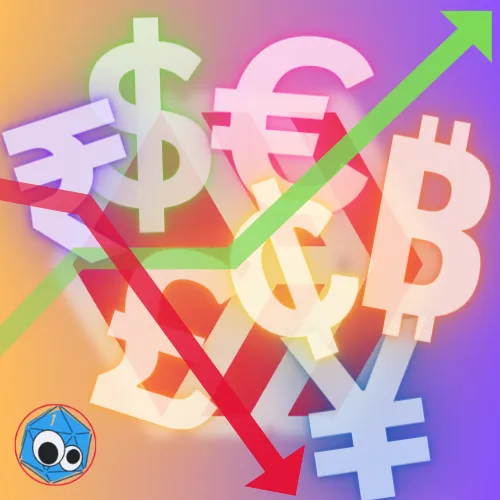
To the man on the street, "inflation" is just a trend of increasing prices over time. The usual culprit in modern pop culture analysis is "corporate greed." Apparently to them, this vice ebbs and flows due to mysterious forces. This "greed" also handily explains why the rich get richer at a rate which far outpaces the working class. "Greed" is also therefore behind stagnation in real earnings for decades. For those who do not turn their ire toward corporate cronyism, immigrant labor and welfare programs are common scapegoats. In any case, the economy is a sort of zero-sum game, and we're on the losing side of the equation.
While such popular explanations often contain a germ of truth at the foundation, few try to explore what else might be a root cause of these perceived effects. Most just continue to clamor for the politicians who appeal most to their prejudices each election cycle. There is a false dichotomy between "the people" and "the economy." I argue the economy is the sum of all productive human actions, including everything from acquiring raw materials to transforming them into consumer goods, including mining, agriculture, manufacturing, warehousing, transportation, and retail.
The economy is people striving to achieve their desired ends by voluntary means, in contrast to politics. I contend democracy is not "how we work together in order to achieve common ground," or any of the other popular platitudes we learned in Civics. This is the real zero-sum game, and the perceived systemic flaws in capitalism or instances of "market failure" tend to be a consequence of politics instead.
Inflation
Price increases are not inflation in and of themselves, but rather a consequence of money supply increases through credit expansion and money creation. Our current economic model is built on fiat money, not a monetized commodity like gold or silver. Legal tender laws mandate acceptance of notes backed by nothing but the ink with which they are printed, and today, most dollars are not even physical notes, but rather notations on various digital ledgers.
When money is no longer a commodity itself, more money does not benefit the economy. Wealth in the abstract is goods and services desired by consumers. Increasing the money supply does not create more shoes, cars, watts of electricity, barrels of oil, tons of corn, or anything else people want and need. It means at best that more money is chasing the same preexisting pool of goods and services, necessitating a proportionate increase in prices as a response to restore equilibrium.
The Cantillon Effect
Increasing the money supply does not just cause an immediate change in prices and wages for everyone across the board, though. After all, what would be the point if it did? Inflation transfers wealth in an opaque, byzantine fashion away from public view. Understanding this requires a look back at a centuries-old concept.
Richard Cantillon was born some time in the 1680s, and died in 1734. As such, his body of work predated many concepts and discoveries, but his insights also helped build toward them. It's easy to look back and scoff at the ignorance of our predecessors, but they had more primitive tools and concepts, yet managed to make progress toward insights we now take for granted. Critics of the Austrian school analysis gleefully use the historical and philosophical context of Cantillon's writings to skewer Austrian use of this concept.
Cantillon effects are universally valid occurrences of any monetary economy. They are not, contrary to how many Austrians view them, a fundamental evil unique to fiat central bank systems. Monetary growth, be it through physically mined gold, virtually mined bitcoins, or digitally increased fiat money, always produces the redistributive effects of purchasing power that Cantillon concerned himself with.
Austrians also overstate their case, at least as far as Cantillon’s writing is concerned; to our “man of mystery,” monetary redistribution does not inevitably set the economy on a path of unsustainable boom and bust — relative prices, wealth, and consumption desires adjust. In contrast to modern Austrians, Cantillon makes no distinction between new money entering the credit market and that entering the goods market. To him, the effects are equivalent.
Critics of Austrian school thought rarely understand what they critique. Austrians like to point out their use of economic history and scholarly research, giving credit to people whose insights they use. Physicists respect Isaac Newton for his pioneering research into gravity, motion, and other fundamental concepts even though he also believed in alchemy, and Albert Einstein's theories of relativity and subsequent exploration of space-time superseded his ideas. Developing one insight is not somehow acceptance of any other positions held by Cantillon, and requires no acceptance of Cantillon's conclusions even in that narrow field. Further, Austrians are well aware of instances like the Spanish plunder of gold and silver from the New World leading to inflation of a specie currency.
Cantillon's insight was that new money entering the economy does not create a uniform increase in prices and wealth throughout society. Instead, those who receive the new money first can spend it before prices adjust, and those economically furthest from the new money see increased prices before the new money reaches their own pockets. Prices also do not uniformly rise in direct proportion to the increase in supply, but rather rise and fall in a tumultuous process until a new equilibrium is found.
The Wealth Gap
If some market actors get new money before prices can adjust, and other market actors face price adjustments before they receive new money, you can already see the basis for an inevitable wealth gap in an inflationary economy. Since the early 1900s, most of the world has drifted toward fiat money and inflation as a means to fund government without as much direct and open taxation. This also means ancillary benefits for those with political connections, including industrialists, financiers, and weapons manufacturers.
When new money is pumped into the system, these key players can see what is coming down the pike. The "stimmy checks" were just a drop in the bucket when the COVID inflation occurred. The bulk of the funding went straight into the corporate coffers of cronies. As the Foundation for Economic Education warned, Because of Inflation, We’re Financing the Financiers. They dumped the money into stocks, real estate, and other long-term assets while everyone else was just trying to stay fed and clothed while their means of sustenance were cut off. That is part of why housing prices trended upward and the stock market barely noticed while the real economy nosedived.
Government action actively grows the wealth gap. There is no other conclusion to be drawn from sober analysis of the facts. Actions have consequences, and blaming "greed" papers over real cause-and-effect analysis.
A Broad Outlook
The US Federal Reserve has raised interest rates in an effort to forestall severe problems from that previous inflationary process as the ripples spread wider and wider across our economic pond, and other nations are in similar positions. This means the cost to merely service the US national debt will also balloon, resulting in further shortfalls as the consequences of a massive deficit-based national budget hit home. Uncertainty has led to an inverted yield curve as buyers of government debt shift to a short-term focus instead of holding debt long-term.
I don't want to go full Chicken Little and say, "the sky is falling!" Nonetheless, all major indicators of systemic economic instability are present. We are at least looking at an echo of the 2008 housing bubble collapse and potentially a stock market collapse similar to the dot-com bubble bursting in 2000. None of the current crop of US presidential candidates except maybe Vivek Ramaswamy have any real idea what root problems we face or how to address them effectively.
I hope I am wrong, but I am incredibly pessimistic in the economic and political outlook for the next several years. Bad money and bad politics aside, we also have chicken hawks eager to enter new wars and an aging set of incumbents in office, both signs of an empire in collapse, not a strong society ready to build upward.
The Point
Is it really so surprising such people benefit from the system they created and continue to support? Set aside the rhetoric of people calling for more regulatory capture behind a veneer of "social justice" platitudes or "diversity, equity, and inclusion." They are consolidating wealth and power to the applause of many of their victims. This is also why the media, politicians, and many corporations are reluctant to embrace cryptocurrency without "protective regulations" and "oversight." It's not because they want to protect us, but because they want to protect their bottom line. Their game of Monopoly ends if we are free to leave the board and play our own game instead.
No matter what the future holds, focus on being a good neighbor, and to hell with being a good citizen. The State is not society. Wall Street is not Main Street. Laws are just the opinions of authoritarian sociopaths, not the source of virtue and morality. Don't get suckered into supporting the system that has failed us repeatedly, and instead spend your energy, time, and resources on something real.

If you hated this post, definitely do not read the following:
- Shrinkflation, Store Brands, & Allergens
- Another Perspective on Investment
- A Deficiency of Patriotism?
- Attacks on Anonymity
- Free Speech Absolutism
- Debt, Investment, Savings, and Time Preference
- A Struggle for Meaning and Purpose in Religion
- Blame Capitalism!
- Eclipsing Current Events
- Hoarding Wealth and Other Capital Crimes?
